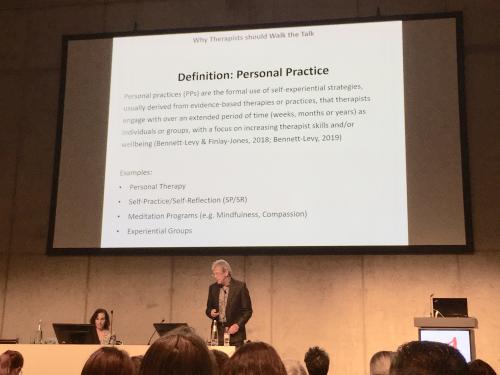CBT World Congress: 3rd conference day - working alliance, cbt v's ipt, iapt, positive psychology & imagery
Last updated on 20th July 2019
This is the third & last day of the conference proper ...
More to follow

This is the third & last day of the conference proper ...
More to follow

Well this was a fascinating day ... I went to my friend James Bennett-Levy's fine symposium on "Self-practice/self-reflection (SP-SR) at 18: an experiential training strategy maturing into adulthood", then on to an interesting & helpful symposium discussing broader applications of Arnoud Arntz's imagery approaches - "Efficacy of imagery rescripting as a transdiagnostic intervention". And to complete the morning's cornucopia I was back listening to James delivering a barn-storming plenary on "Personal practice: why therapists should walk the talk." I sat with Judy, James's wife, and we considered standing to applaud at the end but decided this might be a bit over-the-top, even if richly deserved.
I wrote yesterday about a pre-conference workshop I attended on "Reimagining CBT for depression" with Keith Dobson. Today is the first of the three full days of the '9th World Congress of Behavioural & Cognitive Therapies' conference proper. They aren't taking any prisoners ... each day runs from 8.30am to 6.00pm. My Airbnb is about a 40 minute walk from the CityCube conference centre, so the day pretty much runs from 7.30am to 7.00pm ... not a holiday!
I'm at the '9th World Congress of Behavioural & Cognitive Therapies' in Berlin. As is routine with these kinds of events, the day before is taken up with pre-conference workshops. There are 31 of them! 18 are full-day and the rest half-day. A lot of choice. I've gone for "Reimagining CBT for major depression" with Keith Dobson. The full title includes " ... : using a contextual framework to conceptualize and treat depression."
I recently wrote a first blog post introducing the excellent workshop that Michelle Craske ran before this year's BABCP annual conference. It's easy to see Michelle's work as only relevant for improving outcomes in exposure therapy of anxiety disorders. However I think these ideas are important much more widely than this. Probably most of us have significant areas of our lives where we would benefit if we had the belief & courage to change. Self-determination theory research has underlined the wellbeing benefits of living more autonomously, while Shalom Schwartz's work on values highlights how self-direction in thought & action (when balanced with warm-heartedness & kindness) is so widely respected all around the world (for more on this important balance, see the se
I have already written blog posts about the great half day pre-conference workshop I went to - "Glasgow BABCP conference: Pre-conference workshop - the excellent Michelle Craske on 'Exposure therapy in the 21st century'" - and the first full day of the conference - "Glasgow BABCP conference: 1st day - lecture rant, Anke Ehlers on PTSD, a workshop on 'the strong & curious therapist', and more". Sadly I didn't get to the second day of the conference, but I certainly went to the final half day attending a very fine two hour 'clinical skills' class with Jaime Delgadillo on&nb
Yesterday was the first full day of the two & a half day (plus one day of pre-conference workshops) BABCP summer conference in Glasgow. It feels like I've been going to these annual BABCP get-togethers for a thousand years. In so many ways, I think they're great ... although, for a society that prides itself on being evidence-based (more on this later in this post), I do think that the way these conferences are delivered is pretty dusty & traditional. Basically we sit in large tiered lecture halls and listen to major plenary lectures or we sit in smaller rooms for workshops that are very largely just lectures in more extended formats.
This pre-conference workshop with Michelle Craske on "Exposure in the 21st century" was great. A few years ago - in the blog post "Maximising exposure therapy" - I wrote "Michelle Craske & colleagues from the Anxiety Disorders Research Center of UCLA have, for many years, been publishing careful, challenging research on underlying mechanisms & on ways of boosting the effectiveness of exposure therapies for different forms of anxiety. Michelle's list of publications & research presentations runs to 50 pages and begins with a study on musical performance anxiety published in 1984.
This blog post is downloadable as a Word doc.
Ali, S., L. Rhodes, et al. (2017). "How durable is the effect of low intensity CBT for depression and anxiety? Remission and relapse in a longitudinal cohort study." Behaviour Research and Therapy 94: 1-8. http://www.sciencedirect.com/science/article/pii/S0005796717300840
I've woken early. Lying here I feel an unfamiliar hollow pressure in my gut. What is this? Fear? Anxiety? Tension? "Tense apprehension" seems to fit. I'm lying here in the early hours of the morning, a hollow tense apprehension in my belly. And it isn't surprising. Pretty normal in fact as I move closer & closer to major surgery. Consciously. By my own decision. On this journey, travelling down the "kidney donation river", I can hear the roar of the approaching rapids. Surgery soon. It's a pretty standard, basic, healthy response to tense a bit as I move towards the crux, possibly the most intense section of this "donation river". And I don't have to tighten the rest of my body around the belly apprehension. I can let go, loosen in my arms, my face. It's OK. Nothing to do right now.